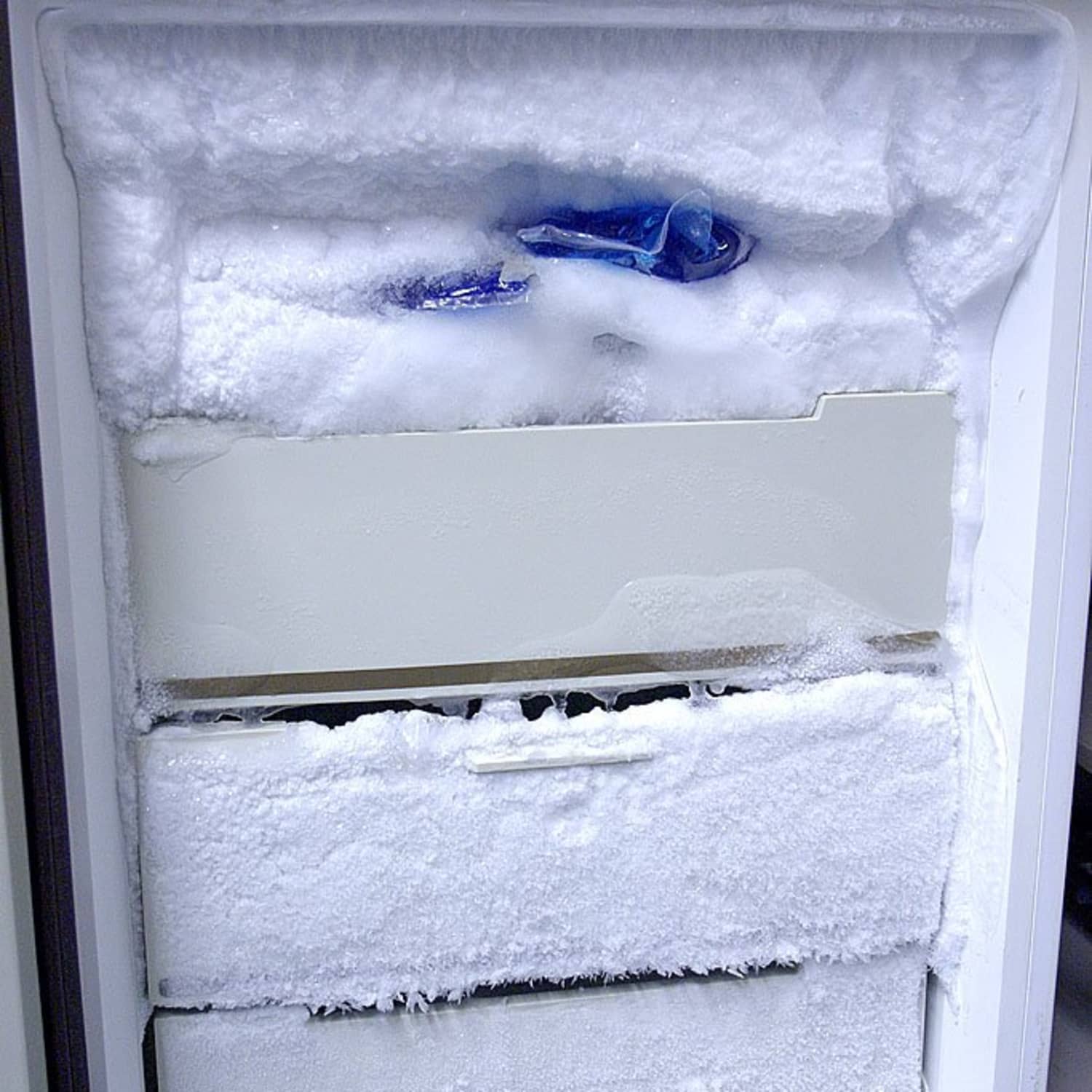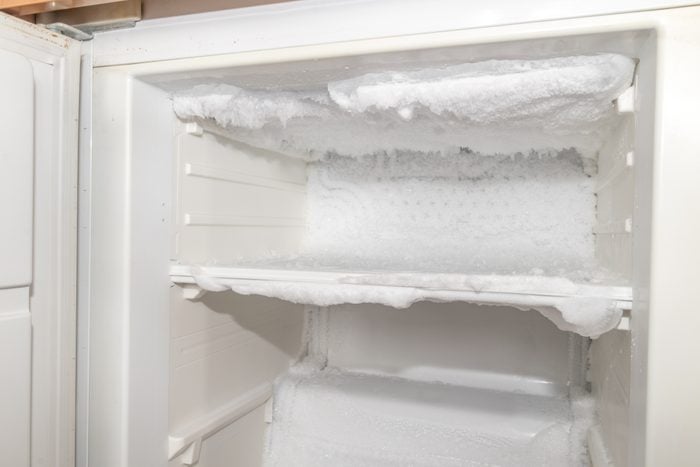If you don’t defrost your freezer, ice will build up, reducing its efficiency and increasing energy consumption. This can lead to spoiled food and potential damage to the appliance.
It’s important to regularly defrost your freezer to maintain its performance and prolong its lifespan. Neglecting this task can result in higher energy bills, reduced storage capacity, and the need for costly repairs or replacement. Additionally, the buildup of ice can hinder the proper sealing of the freezer door, allowing warm air to enter and causing even more ice accumulation.
By defrosting your freezer as recommended by the manufacturer, you can avoid these issues and ensure that it operates effectively.
The Risks Of Neglecting Defrosting
Not defrosting your freezer can lead to several risks and issues. One of the main problems is the buildup of ice. When ice accumulates, it can affect the insulation of the freezer, causing it to work harder and less efficiently. This can result in increased energy consumption and higher electricity bills.
Another risk is the strain it puts on the freezer’s compressor. When the freezer is filled with ice, the compressor has to work harder to maintain the desired temperature. This can lead to excessive wear and tear on the compressor, reducing its lifespan and potentially causing it to break down.
In order to avoid these risks, it is important to regularly defrost your freezer. This involves removing all the food and unplugging the appliance to allow the ice to melt. Once the ice has melted, be sure to clean and dry the freezer before plugging it back in and restocking it with food.
By taking the time to defrost your freezer regularly, you can ensure its optimal performance, prolong its lifespan, and save on energy costs in the long run.
Impact On Food Quality
Not defrosting your freezer can have a significant impact on the quality of your food. One consequence is freezer burn, which occurs when the food is exposed to air and moisture. This leads to dehydration, causing the food to lose its moisture and become dry and unappetizing. Freezer burn can also affect the taste and texture of the food, making it tough and flavorless.
Energy Efficiency Concerns
Not defrosting your freezer can lead to increased energy consumption. When ice accumulates, the freezer has to work harder to maintain the set temperature, resulting in higher energy usage. This can lead to higher electricity bills and wasted energy. Inefficient freezing can also impact the lifespan of the freezer, leading to potential repair or replacement costs. Regularly defrosting your freezer can help maintain its energy efficiency and save you money in the long run.

Credit: www.summitappliance.com
Safety And Health Implications
Not defrosting your freezer can have serious safety and health implications. One of the potential risks is the growth of harmful microbes. When ice builds up in the freezer, it creates a moist environment that can promote the growth of bacteria, mold, and other pathogens. This can contaminate the food stored in the freezer and lead to foodborne illnesses. Additionally, not defrosting your freezer can also increase the risk of cross-contamination. For example, if you store raw meat in the freezer and it drips onto other foods, the bacteria from the meat can spread to other items in the freezer, increasing the risk of contamination. Therefore, it is crucial to regularly defrost your freezer to prevent these potential health hazards.
Maintenance And Longevity Of Appliance
Proper maintenance, including regular defrosting, is crucial for the longevity of your freezer. Neglecting to defrost can lead to inefficient cooling, increased energy consumption, and potential damage to the appliance. Stay on top of maintenance to ensure optimal performance and extend the lifespan of your freezer.
| Defrosting your freezer is crucial for maintenance and longevity of your appliance. |
|---|
| Premature wear and tear: |
| When you don’t defrost your freezer, ice buildup can cause the appliance to work harder to maintain the desired temperature. This can lead to premature wear and tear on the compressor, which is the most expensive component of the freezer. A faulty compressor can result in costly repairs or even replacement of the entire appliance. |
| Avoiding costly repairs and replacements: |
| Regularly defrosting your freezer can save you from costly repairs and replacements. It helps to maintain the efficiency of the appliance and extends its lifespan. Additionally, defrosting your freezer allows you to clean it thoroughly, which is essential for preventing unpleasant odors and ensuring the safety of your food. |
Defrosting Techniques
Defrosting your freezer is an essential task to maintain its efficiency and prolong its lifespan. There are two main techniques for defrosting your freezer – manual and automatic defrosting. Manual defrosting involves turning off the freezer and allowing the ice to melt naturally. On the other hand, automatic defrosting is a more convenient option as it involves a self-defrosting system that melts the ice automatically.
To defrost your freezer, it is recommended to follow some best practices. Firstly, remove all the food items from the freezer and store them in a cooler or insulated bag. Then, turn off the freezer and unplug it from the power source. Next, place towels or newspapers on the floor to absorb any water that may leak during defrosting. After the ice has melted, use a sponge or cloth to wipe down the interior of the freezer. Finally, plug the freezer back in and wait for it to reach the desired temperature before putting the food items back in.
| Best Practices for Defrosting Your Freezer |
|---|
| Remove all food items from the freezer and store them in a cooler or insulated bag. |
| Turn off the freezer and unplug it from the power source. |
| Place towels or newspapers on the floor to absorb any water that may leak during defrosting. |
| Allow the ice to melt naturally or use an automatic defrosting system. |
| Use a sponge or cloth to wipe down the interior of the freezer. |
| Plug the freezer back in and wait for it to reach the desired temperature before putting the food items back in. |
Troubleshooting Common Issues
Not defrosting your freezer can lead to a buildup of excessive frost, which can cause a range of issues. One common issue is reduced efficiency, which can cause your freezer to use more energy and lead to higher bills. Additionally, excessive frost can cause your freezer to run constantly, leading to wear and tear on the appliance. If left unchecked, the frost can also cause damage to the freezer’s components, such as the fan or thermostat.
If you are dealing with excessive frost, there are a few troubleshooting steps you can take. First, try manually defrosting the freezer. This may solve the issue and improve efficiency. If the problem persists, check the door seal to ensure it is not damaged or dirty. A damaged seal can allow warm air to enter the freezer, leading to frost buildup.
If these steps do not resolve the issue, it may be time to seek professional help. A technician can diagnose the problem and recommend a course of action, such as replacing a faulty component or repairing a damaged seal.

Credit: www.thekitchn.com
The Right Time To Defrost
Defrosting your freezer at the right time is crucial to maintain efficiency and prevent damage. Recognizing signs such as buildup of ice, frost on food, or increased energy usage can indicate the need for defrosting. Scheduling regular maintenance, such as quarterly checks, can help you stay on top of this task. Setting a calendar reminder or linking it to another routine activity can help you remember to defrost your freezer at the appropriate intervals. By staying proactive, you can avoid potential issues and extend the lifespan of your appliance.

Credit: www.rd.com
Frequently Asked Questions
How Long Can A Freezer Be Off Without Defrosting?
A freezer can be off for up to 48 hours without defrosting, but it may vary depending on the model and the amount of food inside. It’s recommended to keep the freezer closed during a power outage to maintain the temperature and prevent the food from spoiling.
What Happens If You Don’t Defrost?
If you don’t defrost, the food may spoil, lose its flavor, and become unsafe to eat. It can also lead to uneven cooking and longer cooking times. Ensure you defrost food properly to maintain its quality and prevent potential health risks.
What Happens When You Don’t Defrost A Fridge?
Not defrosting a fridge can lead to ice buildup, reduced efficiency, and potential damage to the appliance. It can also lead to increased energy consumption and food spoilage. Regular defrosting helps maintain optimal performance and extends the lifespan of the fridge.
Why Is It Important To Defrost A Freezer?
Defrosting a freezer is important to prevent ice buildup, maintain energy efficiency, and preserve food quality. Excess ice can reduce cooling effectiveness and increase energy consumption. Regular defrosting ensures optimal performance and prolongs the lifespan of the appliance.
Conclusion
Defrosting your freezer is essential for its efficiency and longevity. Neglecting this task can lead to increased energy consumption and potential damage to the appliance. Regular defrosting also helps to maintain food quality and prevents the buildup of ice and frost.
By prioritizing this simple maintenance task, you can ensure that your freezer operates optimally and preserves your food effectively.
